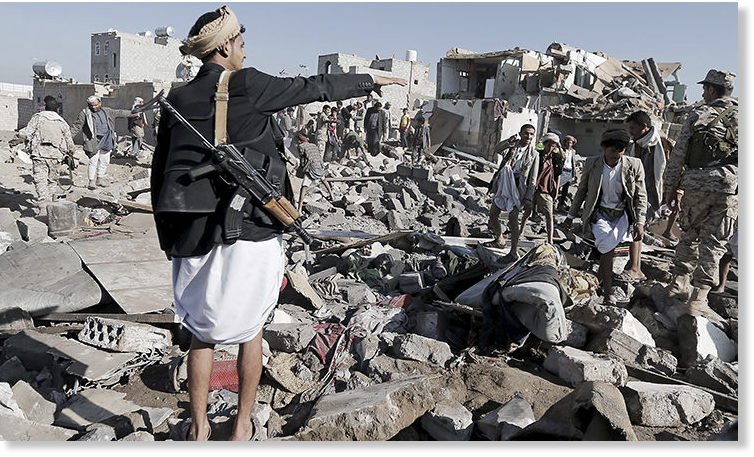
Yemen conflict and wars involve International, Regional and national players. The major regional players include AQAP, Saudi Arabia, UAE and Israel, to name a few. In this article, we look at the roles played by some of them.
Al Queda in the Arabian Peninsula (AQAP)
AQAP is a Sunni Islamist militant organization, established in 2009, which seeks to overthrow the Yemeni government and establish the Islamic Emirate of Yemen. It was formed as a merger between al-Qaeda in Yemen and Saudi Arabia. Since it is an offshoot of the Al-Queda group, we have to consider this an external player but a major one since the US entered Yemen, (supposedly) chasing the AQAP.
In the aftermath of the 2011 Yemeni Revolution, the group seized the opportunity to establish several emirates in southern Yemen, including in Zinjibar, the capital of Abyan governorate. But they were driven out by a government offensive in 2012 and the group returned with an insurgent campaign. They again capitalized the Yemeni civil war of 2014, seizing much of southern Hadhramaut governorate, including its capital Mukalla, recapturing their emirates in the south, and establishing a presence across multiple fronts in the civil war against the Houthis, most prominently in Aden, al-Bayda governorate and Taiz. Thereafter their presence waned due to infighting and attacks by allied forces.
AQAP’s political violence surged in 2022-23, where they used drones and IEDs to target forces affiliated with the STC.
AQAP has been designated a terrorist organization by the UN, US, Saudi Arabia, UAE and several other countries and they are pitched against the Houthis. The only way to contain them is to curb their funding and weaponry, which is unlikely as these are probably supplied by western entities.
Saudi Arabia(KSA)
Saudi Arabia’s interest in Yemen, especially its land, goes ages back. In modern history(publicised), their interest in Yemen can be seen in the 1800s, when Saudi forces took control of Ottoman-ruled Yemen’s territory of Tihama in 1803 which was taken back by the Ottomans in 1818.
In 1934, in the Saudi–Yemeni War, the Saudis under Ibn Saud captured Azir, Jizan, Nazran and occupied 100 kms of Yemenese coastline. They have had decades-long border disputes, Yemen losing bits and pieces of its territories over time to Saudi Arabia. But in the 1948 civil uprising in Yemen, the Saudis supported Imam Ahmed, because they preferred a former adversary(tribal monarch) to a democratic state as its neighbor.
The Saudi desire to control the Red Sea especially the Bab el-Mandeb strait may be at the bottom of their involvement in Yemen, cemented by its allergy to a democratic state in the middle east, the Sunni-Shiite divide and to a lesser extent their desire for Yemen’s territories with discoveries of rich mineral resources.
But Saudis also have a history of working together with Yemeni governments and before the civil war, the Yemeni economy depended heavily on Saudi imports into their country comprising over 30% of Yemen’s imports; they are also one of Yemen’s major lenders and they have time and again participated in peace negotiations. For a lasting peace in Yemen, the participation of Saudi Arabia is critical and necessary but they would be required to tone down its regional expansionist agenda and instead, help its neighbour get back on its feet.
UAE
Unlike KSA, UAE’s relations with Yemen started only in the 1970s. UAE along with Germany, chairs the Task Force on Economics and Good Governance in the Friends of Yemen International Group, formed in 2010 to support Yemen’s economic development. UAE is also a major regional lender of Yemen. Yet, in 2018, UAE invaded and took over Socotra Island from Yemen, which brought Saudi troops to the archipelago, brokering a deal returning the island to Yemen. The country is also part of the allied forces under Saudi Arabia which was bombarding Yemen since 2015 to support the Hadi government against the Houthis.
UAE’s intentions are more devious than those of Saudi Arabia who are more interested in the security of the Bab el-Mandeb strait which is one of their major trading routes. UAE being a major gold trading centre as well as international gold smuggling hub, has its eye on Yemen’s gold and other mineral resources. And they are using all means, financial and military, to achieve them.
By 2020, the UAE officially withdrew from Yemen but their clandestine activities may still be continuing.
Israel
Israel has no diplomatic relations with Yemen, since Yemen has consistently denounced Israel since its creation in 1948.
Anyone with Israeli stamp on their passports are denied entry into Yemen, let alone Israeli passport holders. Yemenite Jews who was a significant minority in Yemen were systematically expelled from Yemen and most emigrated to Israel in the last century. And Yemen is classified as “enemy state” by Israel. There is no love lost between the two countries. Yemen has long been diplomatically active against Israeli actions against the Palestinians. But since Yemen’s unification in 1990, Yemen’s hostility to Israel had declined though not normalised.
Though Israel is a small player now in the conflict, its actions have more ramifications. Israel’s intent is always to leave a deadly impact – so they aim key infrastructure and civilians – a warfare they perfected in Palestine. They are also the paid thug of the West, kept in the Middle East to keep the region unstable, militarily and politically dependent on the west, in exchange for reasonable oil deals. So Israel’s further involvement in Yemen’s conflict would be detrimental not just for its peace prospects but also for its existence independent of western colonial forces, who will use it to control Saudi Arabia.
For more on this, please read my article Global conflicts under the radar – Part XXXIII –Yemen – External Players, which is available with half-yearly subscription.


